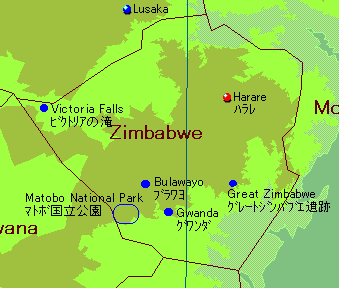 | 11世紀頃から、ショナ王国として栄えましたが、他のアフリカ諸国同様、ヨ-ロッパの植民地になります。 19世紀にはイギリスの植民者セシル・ロ-ズが権力をにぎり、彼の名をとってロ-デシアという国名になりました。しかし、1960年代からの独立闘争で、長きにわたった植民地政策や人種差別政策と戦い1980年に独立を勝ち取った新しい国です。 Zimbabwe means Stone House in Shona.「ジンバブエ」は、「石の家」という意味です。 |
Sorry, translation has not been completed yet. Please enjoy photos and captions.
I participated in a volunteer program held by Earthwatch, Maternal Health in Africa, in August '99. Please read a brief outline of Zimbabwe first.
 | 11世紀頃から、ショナ王国として栄えましたが、他のアフリカ諸国同様、ヨ-ロッパの植民地になります。 19世紀にはイギリスの植民者セシル・ロ-ズが権力をにぎり、彼の名をとってロ-デシアという国名になりました。しかし、1960年代からの独立闘争で、長きにわたった植民地政策や人種差別政策と戦い1980年に独立を勝ち取った新しい国です。 Zimbabwe means Stone House in Shona.「ジンバブエ」は、「石の家」という意味です。 |
 |
| Local people welcomed us to their village. |
The reasons why I chose this project were shown below.
①This project takes place in Africa. (I really like Africa after visiting Kenya in '98.)
②There are many opptunities to contact local people in this project.現地の人々と交流する機会が多いプロジェクトであること。(環境,動物生態調査等では、日常生活がチーム内で完結してしまう。)
③The principal investigator, Dr. Prisca Nemapare, was supposed to come to Japan in June. So I thought I had a chance to listen to her explanation.
In fact, I met many Zimbabweans and got acquainted with them.
 The photo on the right shows Prisca and our volunteer members. In addition, some assistants and interpreters who translated English and local language, Ndebele, worked together. Each volunteer had one interpreter. Regarding volunteer members, they were American ladies except me. 、看護婦,栄養学を専攻している大学生,衛生学を昔学んでいた人等、それなりに関連する知識をもっていました。私はそんなものとは一切関連のない仕事をしているので大丈夫かなあと思いましたが、杞憂でした。唯一の男性ボランティアとして、それなりに貢献できたと思います。これは、主任研究者プリスカのオープンな人柄によることも大きかったです。
The photo on the right shows Prisca and our volunteer members. In addition, some assistants and interpreters who translated English and local language, Ndebele, worked together. Each volunteer had one interpreter. Regarding volunteer members, they were American ladies except me. 、看護婦,栄養学を専攻している大学生,衛生学を昔学んでいた人等、それなりに関連する知識をもっていました。私はそんなものとは一切関連のない仕事をしているので大丈夫かなあと思いましたが、杞憂でした。唯一の男性ボランティアとして、それなりに貢献できたと思います。これは、主任研究者プリスカのオープンな人柄によることも大きかったです。
The resarch area in '99 was Matabeleland South Province, in the south of Zimbabwe. Our team went to a village, called Mtshabezi Mission. We stayed in Guwanda. It takes about 1 and a half hour from Bulawayo, the second biggest city in Zimbabwe by car. From Guwanda to Mtshabezi Mission, it takes about 1 hour by car.
Volunteers' tasks were
 |
| A volunteer is lectuturing on. |
 |  |
| A local people's house | School students we visited. |